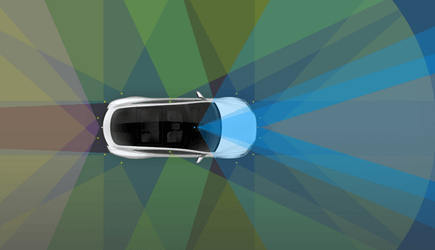Driven or driverless... can they coexist safely?
May 25, 2017
on
on

A new study by Nuance communications and the Deutsches Forschungszentrum für Künstliche Intelligenz (DFKI) investigates the best method to alert the ‘driver’ in driverless cars. It appears that drivers react more quickly to a nudge (haptic) or audible alert rather than a visual indicator to tell them they need to take over control. Since the tragic Tesla accident the company have recommended that their self-driving autopilot is technically a driver-assist facility, requiring you to remain alert with your hands on the wheel and ready to wrest control away from the computer at any time.
In terms of control autonomy, a Level-3 driver control system allows hand-over between driver and computer while Level 4 requires no driver input. Ford plan to move straight to a Level-4 system; they argue that Level 3 could be dangerous. Imagine how stressful it would be if you were asked to take control because the autopilot had detected a hazard and suddenly run out of options. Truth is you would need to be continuously vigilant.
Put it down to my cynicism but in a world of driven and driverless vehicles it occurs to me that a driver with manual control could be tempted to drive more recklessly and risk pulling out in front of a driverless vehicle in the knowledge that its array of sensors will automatically apply the brakes or swerve to avoid a collision.
Imagine the first morning in your driverless car in amongst a sea of manually-driven vehicles; do you think you’ll get to work sooner or later than usual? Chances are on day two you will be switching to manual… if that option is available.
Image courtesy tesla.com
In terms of control autonomy, a Level-3 driver control system allows hand-over between driver and computer while Level 4 requires no driver input. Ford plan to move straight to a Level-4 system; they argue that Level 3 could be dangerous. Imagine how stressful it would be if you were asked to take control because the autopilot had detected a hazard and suddenly run out of options. Truth is you would need to be continuously vigilant.
Put it down to my cynicism but in a world of driven and driverless vehicles it occurs to me that a driver with manual control could be tempted to drive more recklessly and risk pulling out in front of a driverless vehicle in the knowledge that its array of sensors will automatically apply the brakes or swerve to avoid a collision.
Imagine the first morning in your driverless car in amongst a sea of manually-driven vehicles; do you think you’ll get to work sooner or later than usual? Chances are on day two you will be switching to manual… if that option is available.
Image courtesy tesla.com
Read full article
Hide full article



Discussion (0 comments)